The backyard poultry market is growing rapidly but many novice poultry owners are unaware of simple preventative health routines that can significantly improve the health and wellbeing of their birds.
 Worms are not always visible and infection can be asymptomatic but worms can also affect egg quality and yield – fewer, smaller, paler, brittle eggs can result. Affected poultry can suffer ill thrift, anaemia and even death. The non-specific nature of the condition can make it hard for novices to identify.
Worms are not always visible and infection can be asymptomatic but worms can also affect egg quality and yield – fewer, smaller, paler, brittle eggs can result. Affected poultry can suffer ill thrift, anaemia and even death. The non-specific nature of the condition can make it hard for novices to identify.
Sources of infection
Embryonated worm eggs resist disinfectants and can survive for years.
Sources include:
- An infected bird excreting thousands of worm eggs daily
- Contaminated soil or litter material
- An intermediate host (wild bird, earthworm or beetle)
- Fomite transmission: footwear, equipment or other animals.
Free range and deep litter husbandry systems increase exposure to parasitic worms and may favour worm egg survival. Active infections of the common worms affecting poultry: Ascaridia (roundworms), Capilliaria (hairworms), Syngamus trachea (gapeworm), Heterakis (small roundworms) and Amidostomum anseris (gizzard worm) in geese need to be controlled through effective preventative and strategic de-worming programmes.
There is more information here on our page about worming poultry.
Before using Flubenvet
 Before you use Flubenvet, I would highly recommend you check to see whether it is actually necessary using a worm count kit (which is very easy to use).
Before you use Flubenvet, I would highly recommend you check to see whether it is actually necessary using a worm count kit (which is very easy to use).
You’ve probably heard about antibiotic resistance and the resistance that worms have built up in other farmed animals such as sheep? Well unfortunately it’s the same with chickens. If we over-use Flubendazole (the active ingredient in Flubenvet) then we risk having resistant worms in the future.
In a nutshell, a small number of worms might survive treatment and these go on to produce future generations of worms with the same genetic traits. Just like we’ve selected our chickens over the years to get our specific breeds, we are inadvertently selecting worms that are resistant to the wormer!
So before you use Flubenvet, please consider checking whether it is necessary with a worm-count kit.
Treatment guidelines
Preventative health routines
At each treatment use Flubenvet® in feed for 7 days as directed:
- Worm all new poultry when introducing to the flock
- Before introducing the flock to pasture
- The whole flock spring, summer and autumn as a preventive
Available in a 1% 60g pack sufficient to treat around 20 chickens
Active infections
Random worming may not be effective because worm eggs in the environment are a source of ongoing infection for a number of years.
Strategic programmes:
-

Take into account the pre-patent period of common poultry worms
- Rely on treating at intervals shorter than the prepatent period until infection pressure is reduced, as measured by a reduction in faecal eggs per gram (EPG) counts
- Once infection pressure is reduced, regular treatment will help keep the level of adult egg laying worms in the birds to a minimum.
Strategic de-worming
In the face of active infection, at each treatment administer Flubenvet® in feed:

There is some information on how to mix Flubenvet, so that it will stick to the pellets on the Keeping Chickens: A Beginners Guide website – the Flubenvet poultry wormer page.
Flubenvet® for the domestic poultry keeper:
- Made from a licensed formulation specifically for the smaller poultry flock.
- Can be supplied through oral prescription by a vet, pharmacist or SQP.
- Available in a 60 g pack which can treat around 20 birds for 7 day treatment period.
 Simple dosing using supplied scoop – just one 6g scoop treats 2 kg of food for chickens or geese, one 6 g scoop treats 3 kg of food for turkeys.
Simple dosing using supplied scoop – just one 6g scoop treats 2 kg of food for chickens or geese, one 6 g scoop treats 3 kg of food for turkeys.- Kills all stages of common poultry worms.
- Zero egg withdrawal during and after treatment for chickens
Contra-indication, warnings and precautions:
Birds must not be slaughtered for human consumption during treatment. Treated birds may be slaughtered for human consumption only after 7 days from the last treatment; the meat withdrawal time is 7 days. There is no withholding period for chickens producing eggs for human consumption when the product is used at the recommended inclusion rate; the egg withdrawal time is zero days.
For Animal Treatment Only. To be supplied only on veterinary prescription – from your veterinarian, pharmacist or a suitably qualified person.
Keep out of the reach of children. Store in tightly closed, original container below 25°C.
Operator warnings:
- The product is a powder and mixing may generate dust.
- Prepare the product in a well ventilated place.
- Do not breath dust.
- If accidental inhalation of dust occurs, move to an outdoor area with fresh air.
- To avoid accidental inhalation wear a disposable dust mask (that conforms to European Standard EN149)
- Accidental ingestion by humans should be avoided.
- Avoid direct skin contact. Wear impervious gloves when mixing and handling the product.
- Wash affected parts if skin contact occurs.
- If accidental eye contact occurs, immediately rinse thoroughly with water.
Disposal Advice
Dispose of empty containers in the domestic refuse. Used containers should not be recycled.
For further information contact: Janssen Animal Health, 50-100 Holmers Farm Way, High Wycombe, Bucks, HP12 4EG, UK. Tel 01494 567555 Fax 01494 567556
EMail ahealth@jacgb.jnj.com Flubenvet 1 % Medicated Premixture is produced from Flubenvet Premix containing flubendazole 5% w/w Vm 00242/4056


 Simple dosing using supplied scoop – just one 6g scoop treats 2 kg of food for chickens or geese, one 6 g scoop treats 3 kg of food for turkeys.
Simple dosing using supplied scoop – just one 6g scoop treats 2 kg of food for chickens or geese, one 6 g scoop treats 3 kg of food for turkeys.


